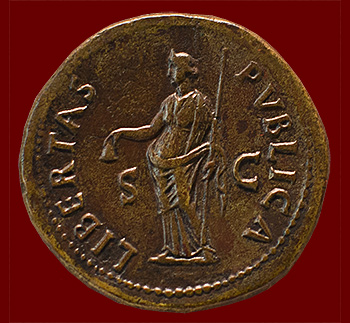
You are saddened to see this once magnificent building now looking somewhat dilapidated through neglect. The Atrium Libertatis (Hall of Liberty) formerly contained the offices and records of the two censors, high-ranking magistrates in the Roman cursus honorum. However, the last two censors were appointed by Augustus in 22 BCE; since that time the duties of this magistrate have been absorbed by the emperor or parceled out to lesser officials. During the Republic, the censors' main duty to was to conduct the census and keep the rolls of Roman citizens and their property; they also were guardians of public morality, revised the lists of senators and equestrians, and administered some aspects of state finances. The name "Hall of Liberty" may refer to the fact that the censors enrolled freed slaves in the citizenship lists.
On the coin above, the goddess Libertas holds a scepter and a pileus, the round felt cap that freed slaves put on to signify their new status; this cap came to symbolize release from an enslaved condition. Galba may have issued this coin in 68 CE to symbolize the freedom of the state from the oppression of Nero. Certainly Brutus intended this meaning on his denarius that places the pileus between two daggers, referring to the assassination of Julius Caesar on the Ides of March.
That assassination prevented Caesar from fulfilling one of his projects, the plan to build a great public library, but one of Caesar's supporters, Gaius Asinius Pollio, brought that project to fruition in 39 BCE. Pollio was a Roman aristocrat with many talents--magistrate, orator, historian, poet, and patron of poets. He used the spoils from a successful military campaign in Illyria to splendidly restore the Atrium Libertatis and to expand it to include Rome's first public library, with reading rooms for Greek and Latin literature. In the words of Pliny the Elder,
Asini Pollionis hoc Romae inventum, qui primus bibliothecam dicando ingenia hominum rem publicam fecit. (Natural History 35.10)
"At Rome this was the invention of Asinius Pollio who, by dedicating a library, first made the works of human genius public property."